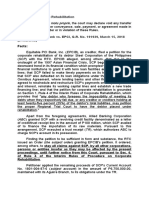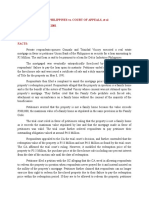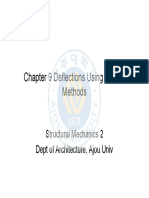Lipana vs. Development Bank of The Philippines Digest
Lipana vs. Development Bank of The Philippines Digest
Uploaded by
Joseph MacalintalCopyright:
Available Formats
Lipana vs. Development Bank of The Philippines Digest
Lipana vs. Development Bank of The Philippines Digest
Uploaded by
Joseph MacalintalOriginal Description:
Original Title
Copyright
Available Formats
Share this document
Did you find this document useful?
Is this content inappropriate?
Copyright:
Available Formats
Lipana vs. Development Bank of The Philippines Digest
Lipana vs. Development Bank of The Philippines Digest
Uploaded by
Joseph MacalintalCopyright:
Available Formats
Lipana vs.
Development Bank of the Philippines
After the Monetary Board has declared that a bank is insolvent and has ordered it to cease operations, the Board becomes the
trustee of its assets for the equal benefit of all the creditors, including depositors. To execute the judgment would unduly deplete
the assets of respondent bank to the obvious prejudice of other depositors and creditors.
Facts: Petitioners opened and maintained both time and savings deposits with the respondent Development Bank of Rizal. When
some of the time deposit certificates matured, petitioners were not able to cash them but instead were issued a manager’s check
which was dishonored upon presentment. Demands for the payment of both time and savings deposits have failed. Hence,
petitioners filed with the RTC a collection suit with prayer for issuance of a writ of preliminary attachment which was granted by the
court. The RTC rendered judgment in favor of petitioners. Meanwhile, the Monetary Board placed the respondent bank under
receivership. Subsequently, the motion for execution pending appeal filed by petitioners was granted by the court but was also
stayed by the trial judge. The motion filed by petitioners to lift the stay order having been denied, this petition was filed.
Issue: Whether or not respondent judge could legally stay execution of judgment that has already become final and executor
Held: In the instant case, the stay of the execution of judgment is warranted by the fact that respondent bank was placed under
receivership. To execute the judgment would unduly deplete the assets of respondent bank to the obvious prejudice of other
depositors and creditors, since, as aptly stated in Central Bank of the Philippines vs. Morfe (63 SCRA 114), after the Monetary Board
has declared that a bank is insolvent and has ordered it to cease operations, the Board becomes the trustee of its assets for the
equal benefit of all the creditors, including depositors. The assets of the insolvent banking institution are held in trust for the equal
benefit of all creditors, and after its insolvency, one cannot obtain an advantage or a preference over another by an attachment,
execution or otherwise.
After the Monetary Board has declared that a bank is insolvent and has ordered it to cease operations, the Board becomes the
trustee of its assets for the equal benefit of all the creditors, including depositors. The assets of the insolvent banking institution are
held in trust for the equal benefit of all creditors, and after its insolvency, one cannot obtain an advantage or a preference over
another by an attachment, execution or otherwise. To execute the judgment would unduly deplete the assets of respondent bank to
the obvious prejudice of other depositors and creditors.
You might also like
- Master Slave ContractDocument8 pagesMaster Slave ContractKeven Asselin100% (1)
- The FourDocument1 pageThe FourStephenNo ratings yet
- Banco Filipino Savings and Mortgage Bank v. Monetary Board, G.R. No. 70054Document2 pagesBanco Filipino Savings and Mortgage Bank v. Monetary Board, G.R. No. 70054xxxaaxxxNo ratings yet
- 3 Loadmasters Vs Glodel FINAL CASE DIGESTDocument2 pages3 Loadmasters Vs Glodel FINAL CASE DIGESTJoseph Macalintal100% (1)
- 3 Loadmasters Vs Glodel FINAL CASE DIGESTDocument2 pages3 Loadmasters Vs Glodel FINAL CASE DIGESTJoseph Macalintal100% (1)
- Salud Vs Central BankDocument2 pagesSalud Vs Central BankCaroline A. LegaspinoNo ratings yet
- Spouses Cesar and Virginia Larrobis Vs Philippine Veterans BankDocument1 pageSpouses Cesar and Virginia Larrobis Vs Philippine Veterans BankAliceNo ratings yet
- Bank of Commerce Vs Serrano DigestDocument1 pageBank of Commerce Vs Serrano DigestLove Dela CruzNo ratings yet
- Abacus v. Manila Banking Corp., G.R. No. 162270Document2 pagesAbacus v. Manila Banking Corp., G.R. No. 162270xxxaaxxxNo ratings yet
- BPI v. FMICDocument4 pagesBPI v. FMICfjl_302711100% (1)
- BelmanDocument2 pagesBelmanBethany MangahasNo ratings yet
- RURAL BANK OF STA. CATALINA, INC. v. LAND BANK OF THE PHILIPPINESDocument2 pagesRURAL BANK OF STA. CATALINA, INC. v. LAND BANK OF THE PHILIPPINESJohn Ray PerezNo ratings yet
- Hermosa Savings and Loan Bank, Inc Vs DBPDocument2 pagesHermosa Savings and Loan Bank, Inc Vs DBPhaydeeNo ratings yet
- BPI vs. Fernandez, 2 September 2015Document1 pageBPI vs. Fernandez, 2 September 2015Jerome GonzalesNo ratings yet
- Koruga v. Arcenas, Et. Al, G.R. No. 168332Document2 pagesKoruga v. Arcenas, Et. Al, G.R. No. 168332xxxaaxxx100% (1)
- RBSM v. MB, G.R. No. 150886Document1 pageRBSM v. MB, G.R. No. 150886xxxaaxxxNo ratings yet
- BPI vs. de RenyDocument1 pageBPI vs. de RenyVanya Klarika NuqueNo ratings yet
- Domingo Manalo v. Court of AppealsDocument1 pageDomingo Manalo v. Court of AppealsCheChe100% (1)
- Balayan Bay V NLDCDocument2 pagesBalayan Bay V NLDCAlyssa Clarizze Malaluan100% (1)
- 11.digested Allied Bank vs. EPCI GR. No. 191939 March 15 2018Document5 pages11.digested Allied Bank vs. EPCI GR. No. 191939 March 15 2018Arrianne ObiasNo ratings yet
- B11 Allied Banking Corporation V Lim Sio WanDocument3 pagesB11 Allied Banking Corporation V Lim Sio WanJ CaparasNo ratings yet
- In Re Petition For Assistance V BIR DigestDocument2 pagesIn Re Petition For Assistance V BIR DigestLiana AcubaNo ratings yet
- Leticia Miranda v. PDIC, BSP and Prime Savings BankDocument1 pageLeticia Miranda v. PDIC, BSP and Prime Savings BankCheCheNo ratings yet
- Castillo v. Uniwide Warehouse ClubDocument1 pageCastillo v. Uniwide Warehouse ClubattymaryjoyordanezaNo ratings yet
- Central Bank of The Philippines v. CA (G.r. No. 88353) DigestDocument2 pagesCentral Bank of The Philippines v. CA (G.r. No. 88353) DigestApril100% (1)
- 8.digested BPI vs. Sarabia Manor Hotel Corp. GR. No. 175844 July 29 2013Document3 pages8.digested BPI vs. Sarabia Manor Hotel Corp. GR. No. 175844 July 29 2013Arrianne ObiasNo ratings yet
- BSP and Chuchi Fonacier vs. Hon. Nina G. ValenzuelaDocument2 pagesBSP and Chuchi Fonacier vs. Hon. Nina G. ValenzuelaKelsey Olivar MendozaNo ratings yet
- Beltran Vs Paic Finance Corp - ToraynoDocument2 pagesBeltran Vs Paic Finance Corp - ToraynoKC ToraynoNo ratings yet
- Connie L. Servo VS Philippine Deposit Insurance CorpDocument2 pagesConnie L. Servo VS Philippine Deposit Insurance CorpMark Dennis AsuncionNo ratings yet
- CIVIL Spouses Jalbay Vs PNBDocument1 pageCIVIL Spouses Jalbay Vs PNBTrem GallenteNo ratings yet
- Metrobank vs. Go Case DigestDocument2 pagesMetrobank vs. Go Case DigestRyzer Rowan100% (1)
- Colinares Vs CADocument2 pagesColinares Vs CARyD100% (1)
- 10, Intengan Vs CADocument2 pages10, Intengan Vs CABOEN YATORNo ratings yet
- Banco de Oro-Epci, Inc. vs. Japrl Development Corporation, Rapid Forming Corporation and Jose U. Arollado G.R. No. 179901 April 14, 2008 FactsDocument2 pagesBanco de Oro-Epci, Inc. vs. Japrl Development Corporation, Rapid Forming Corporation and Jose U. Arollado G.R. No. 179901 April 14, 2008 FactsAdi Lim100% (1)
- Sps. Cristino & Edna Carbonell vs. Metropolitan Bank and Trust Company April 26, 2017 G.R. No. 178467 Bersamin, J.: FactsDocument1 pageSps. Cristino & Edna Carbonell vs. Metropolitan Bank and Trust Company April 26, 2017 G.R. No. 178467 Bersamin, J.: FactsMalolosFire BulacanNo ratings yet
- PNB vs. Erlando Rodriguez and Norma Rodriguez FactsDocument3 pagesPNB vs. Erlando Rodriguez and Norma Rodriguez FactsHazel Grace AbenesNo ratings yet
- Rural Bank of Sta. Catalina, Inc. vs. Land Bank of The PhilippinesDocument1 pageRural Bank of Sta. Catalina, Inc. vs. Land Bank of The PhilippinesNelly HerreraNo ratings yet
- UNION BANK OF THE PHILIPPINES Vs CADocument3 pagesUNION BANK OF THE PHILIPPINES Vs CAAlphaZuluNo ratings yet
- MWSS V DawayDocument2 pagesMWSS V DawayPerry Rubio100% (1)
- Abacus Real Estate Development Center, Inc. v. Manila Banking CorporationDocument1 pageAbacus Real Estate Development Center, Inc. v. Manila Banking CorporationCheCheNo ratings yet
- FEATI Bank V CADocument2 pagesFEATI Bank V CAPerry RubioNo ratings yet
- Digest Case of PNB Vs Manila Oil Refining and Company Inc.Document2 pagesDigest Case of PNB Vs Manila Oil Refining and Company Inc.Eiram G Lear50% (2)
- 9) Ana Maria A. Koruga vs. Teodoro O. Arcenas, JR., Et. Al - Teodoro O. Arcenas Et. Al. vs. Hon. Sixto Marella (2009)Document2 pages9) Ana Maria A. Koruga vs. Teodoro O. Arcenas, JR., Et. Al - Teodoro O. Arcenas Et. Al. vs. Hon. Sixto Marella (2009)AlexandraSoledadNo ratings yet
- Areza vs. Express Savings Bank DIVINAGRACIADocument1 pageAreza vs. Express Savings Bank DIVINAGRACIAAngelica Joyce Belen100% (1)
- Bank of America v. CA (Mulingtapang)Document4 pagesBank of America v. CA (Mulingtapang)Jake PeraltaNo ratings yet
- Tolentino V Gonzales Sy ChiamDocument7 pagesTolentino V Gonzales Sy ChiamJason CabreraNo ratings yet
- People's Trans East v. Doctors of New MillenniumDocument3 pagesPeople's Trans East v. Doctors of New MillenniumJayson RacalNo ratings yet
- South City Homes Vs Ba FinanceDocument5 pagesSouth City Homes Vs Ba Financeangelsu04No ratings yet
- Facts:: Jerry Ong vs. Court of Appeals and Rural Bank of Olongapo, Inc. G.R. No. 112830, February 1, 1996Document2 pagesFacts:: Jerry Ong vs. Court of Appeals and Rural Bank of Olongapo, Inc. G.R. No. 112830, February 1, 1996sabrina gayo100% (2)
- 15 Abacus Real Estate Dev't. Center vs. Manila Bank, G.R. No.162270, 06 April 2005Document2 pages15 Abacus Real Estate Dev't. Center vs. Manila Bank, G.R. No.162270, 06 April 2005Silver Anthony Juarez Patoc100% (1)
- BUSUEGO Vs CADocument2 pagesBUSUEGO Vs CARmLyn MclnaoNo ratings yet
- Apex Bancrights Holdings, Inc. vs. Bangko Sentral NG Pilipinas and PDICDocument2 pagesApex Bancrights Holdings, Inc. vs. Bangko Sentral NG Pilipinas and PDICclvnngc100% (2)
- CaseDocument2 pagesCaseFrancis Coronel Jr.67% (3)
- First Philippine International Bank vs. CADocument2 pagesFirst Philippine International Bank vs. CAMichelle Vale CruzNo ratings yet
- White MarketingDocument2 pagesWhite MarketingScri Bid100% (1)
- Sps. Sobrejuanite vs. ASB Development CorporationDocument2 pagesSps. Sobrejuanite vs. ASB Development Corporationmei_2208100% (2)
- Republic of The Philippines, Represented by The Anti-Money Laundering Council v. First Pacific Network Inc. DIGESTDocument2 pagesRepublic of The Philippines, Represented by The Anti-Money Laundering Council v. First Pacific Network Inc. DIGESTroquesa burayNo ratings yet
- Metrobank vs. Court of AppealsDocument3 pagesMetrobank vs. Court of AppealsAlphaZuluNo ratings yet
- Pleyto V LomboyDocument3 pagesPleyto V LomboyTippy Dos SantosNo ratings yet
- Rule 73 Case DigestDocument2 pagesRule 73 Case DigestJane Dela CruzNo ratings yet
- Bonnevie vs. CADocument1 pageBonnevie vs. CAPalangkikay WebNo ratings yet
- Lipana vs. Development Bank of The Philippines G.R. No. 73884, September 24, 1987Document1 pageLipana vs. Development Bank of The Philippines G.R. No. 73884, September 24, 1987ariel_080503No ratings yet
- Central Bank v. MorfeDocument7 pagesCentral Bank v. MorfejrNo ratings yet
- Sps. Larrobis Vs Philippine Veterans Bank G.R. No. 135706 October 1, 2004 Austria-Martinez, J.Document3 pagesSps. Larrobis Vs Philippine Veterans Bank G.R. No. 135706 October 1, 2004 Austria-Martinez, J.Paolo MendioroNo ratings yet
- Corpo Cases Full Batch 1Document30 pagesCorpo Cases Full Batch 1Joseph MacalintalNo ratings yet
- Cases 1 To 4Document13 pagesCases 1 To 4Joseph MacalintalNo ratings yet
- PEARL ISLAND COMMERCIAL CORPORATION, Plaintiff-Appellee, LIM TAN TONG and MANILA SURETY & FIDELITY CO., INC., Defendants-AppellantsDocument2 pagesPEARL ISLAND COMMERCIAL CORPORATION, Plaintiff-Appellee, LIM TAN TONG and MANILA SURETY & FIDELITY CO., INC., Defendants-AppellantsJoseph MacalintalNo ratings yet
- Switzerland DIGESTDocument2 pagesSwitzerland DIGESTJoseph MacalintalNo ratings yet
- FEB Leasing and Finance Corp vs. Spouses Baylon Et - Al. GR No. 181398, June 29, 2011 FactsDocument4 pagesFEB Leasing and Finance Corp vs. Spouses Baylon Et - Al. GR No. 181398, June 29, 2011 FactsJoseph MacalintalNo ratings yet
- CFI: Issued An Order Denying The Motion. Hence, This Appeal To The SCDocument1 pageCFI: Issued An Order Denying The Motion. Hence, This Appeal To The SCJoseph MacalintalNo ratings yet
- Switzerland DIGESTDocument2 pagesSwitzerland DIGESTJoseph MacalintalNo ratings yet
- Facts: Issue: Held:: Far Eastern Export & Import Co., vs. Lim Teck SuanDocument1 pageFacts: Issue: Held:: Far Eastern Export & Import Co., vs. Lim Teck SuanJoseph Macalintal100% (1)
- Facts:: GONZALO PUYAT & SONS, INC., vs. ARCO AMUSEMENT COMPANY (Formerly Known As Teatro Arco)Document2 pagesFacts:: GONZALO PUYAT & SONS, INC., vs. ARCO AMUSEMENT COMPANY (Formerly Known As Teatro Arco)Joseph Macalintal100% (1)
- Facts:: Andres Quiroga, vs. Parsons Hardware Co., GR No. L-11491 August 23, 1918Document1 pageFacts:: Andres Quiroga, vs. Parsons Hardware Co., GR No. L-11491 August 23, 1918Joseph Macalintal0% (1)
- Sps. Africa DigestDocument2 pagesSps. Africa DigestJoseph MacalintalNo ratings yet
- Facts:: Andres Quiroga, vs. Parsons Hardware Co., GR No. L-11491 August 23, 1918Document1 pageFacts:: Andres Quiroga, vs. Parsons Hardware Co., GR No. L-11491 August 23, 1918Joseph Macalintal0% (1)
- Facts:: GONZALO PUYAT & SONS, INC., vs. ARCO AMUSEMENT COMPANY (Formerly Known As Teatro Arco)Document2 pagesFacts:: GONZALO PUYAT & SONS, INC., vs. ARCO AMUSEMENT COMPANY (Formerly Known As Teatro Arco)Joseph Macalintal100% (1)
- Sps. Africa, Pearl Is., Switzerland DIGESTDocument4 pagesSps. Africa, Pearl Is., Switzerland DIGESTJoseph MacalintalNo ratings yet
- 2 Tuazon Vs Ramos Final Case DigestDocument3 pages2 Tuazon Vs Ramos Final Case DigestJoseph Macalintal100% (1)
- 3 Rallos vs. Felix Go Chan Final Case DigestDocument2 pages3 Rallos vs. Felix Go Chan Final Case DigestJoseph MacalintalNo ratings yet
- Lorbes v. Court of AppealsDocument2 pagesLorbes v. Court of AppealsJoseph Macalintal100% (1)
- Manila Memorial Park Cemetery Vs LinsanganDocument3 pagesManila Memorial Park Cemetery Vs LinsanganTeresa CardinozaNo ratings yet
- 2 Tuazon Vs Ramos Final Case DigestDocument3 pages2 Tuazon Vs Ramos Final Case DigestJoseph Macalintal100% (1)
- League of Cities of The Philippines Vs Comelec 2008Document4 pagesLeague of Cities of The Philippines Vs Comelec 2008Joseph MacalintalNo ratings yet
- G.R NO. 181398Document1 pageG.R NO. 181398Joseph MacalintalNo ratings yet
- Decision Making: Varaidzo Kaguda Business Studies Department University of ZimbabweDocument34 pagesDecision Making: Varaidzo Kaguda Business Studies Department University of ZimbabweNoliboNo ratings yet
- Sale Contract: Karo Investments Limited 27 Toledo Ave, Henderson, Auckland 0612, New ZealandDocument4 pagesSale Contract: Karo Investments Limited 27 Toledo Ave, Henderson, Auckland 0612, New ZealandHo PhamNo ratings yet
- Polytechnic University of The Philippines 115 Founding Anniversary Academic Contests CommitteeDocument2 pagesPolytechnic University of The Philippines 115 Founding Anniversary Academic Contests CommitteeRomeo Castro De GuzmanNo ratings yet
- Capital PunishmentDocument4 pagesCapital PunishmentEric ZuluNo ratings yet
- Feature WritingDocument54 pagesFeature WritingShyra Jane AbonallaNo ratings yet
- Color Doppler Flow Imaging of Retrobulbar Ocular Blood Flow Changes in Retinal Artery Occlusions Caused by Cosmetic Facial Filler InjectionsDocument5 pagesColor Doppler Flow Imaging of Retrobulbar Ocular Blood Flow Changes in Retinal Artery Occlusions Caused by Cosmetic Facial Filler InjectionsKerlida SantosNo ratings yet
- ASCE 52 - Guide For Design of Steel Transmission TowersDocument73 pagesASCE 52 - Guide For Design of Steel Transmission TowersFelipe DornellesNo ratings yet
- How To Join Windows Computer To Domain - Ahadu BankDocument9 pagesHow To Join Windows Computer To Domain - Ahadu Bankeyorica28No ratings yet
- Formato Rae InglesDocument2 pagesFormato Rae InglesAndrea Afanador Arteaga100% (1)
- Ino Yamanaka - Google SearchDocument9 pagesIno Yamanaka - Google SearchTalia WeekesNo ratings yet
- Modal Vs Functional Harmony + Various Q&A About ModesDocument25 pagesModal Vs Functional Harmony + Various Q&A About ModesAnonymous TBwEsioW100% (1)
- Between: Baldo Sansó Rondón - And-Lexisnexis Risk Solutions Uk LimitedDocument14 pagesBetween: Baldo Sansó Rondón - And-Lexisnexis Risk Solutions Uk LimitedLukeNo ratings yet
- 6.GST Constitutional PerspectiveDocument6 pages6.GST Constitutional PerspectiveNaveen SihareNo ratings yet
- Cookery 9 Quarter 3Document33 pagesCookery 9 Quarter 3John Michael ItableNo ratings yet
- Eland Philippines v. Garcia Et AlDocument2 pagesEland Philippines v. Garcia Et AlRodRalphZantua100% (1)
- Flusser-The FactoryDocument2 pagesFlusser-The FactoryAlberto SerranoNo ratings yet
- 2014 - Validation of The Soleris DYM Method For Semiquantitative Determination of Yeast and Mold in A Variety of Foods - AOAC PTM - 051301Document8 pages2014 - Validation of The Soleris DYM Method For Semiquantitative Determination of Yeast and Mold in A Variety of Foods - AOAC PTM - 051301jasminetsai421No ratings yet
- 5.deflections Using Energy Methods PDFDocument47 pages5.deflections Using Energy Methods PDFengkj100% (1)
- De Rebus May 2024Document70 pagesDe Rebus May 2024IDK.comNo ratings yet
- Solvent Sbps 1425 - HPCLDocument2 pagesSolvent Sbps 1425 - HPCLBharat ChatrathNo ratings yet
- Version 1Document62 pagesVersion 1ines.morenoNo ratings yet
- Time, Speed and Distance (Part-1)Document8 pagesTime, Speed and Distance (Part-1)fbmd4ysszbNo ratings yet
- Adverb ClauseDocument20 pagesAdverb ClauseDian Ratna MahitaNo ratings yet
- IBM Storage Interoperability Data 2020-09-10 08-35-43 PDFDocument2 pagesIBM Storage Interoperability Data 2020-09-10 08-35-43 PDFomarxxokNo ratings yet
- 07 Appendix IDocument6 pages07 Appendix IManeesh VNo ratings yet
- Summer Newsletter From Marlow Canoe Club - MCC 144Document12 pagesSummer Newsletter From Marlow Canoe Club - MCC 144John NorrisNo ratings yet
- Compilation of Performance: (With Rubric) Quarter: Third Subject: English 10Document4 pagesCompilation of Performance: (With Rubric) Quarter: Third Subject: English 10CarlaTorreNo ratings yet
- Resolution No. 06 - Liquor & CigarettesDocument2 pagesResolution No. 06 - Liquor & CigarettesEileen ArceoNo ratings yet











































































































